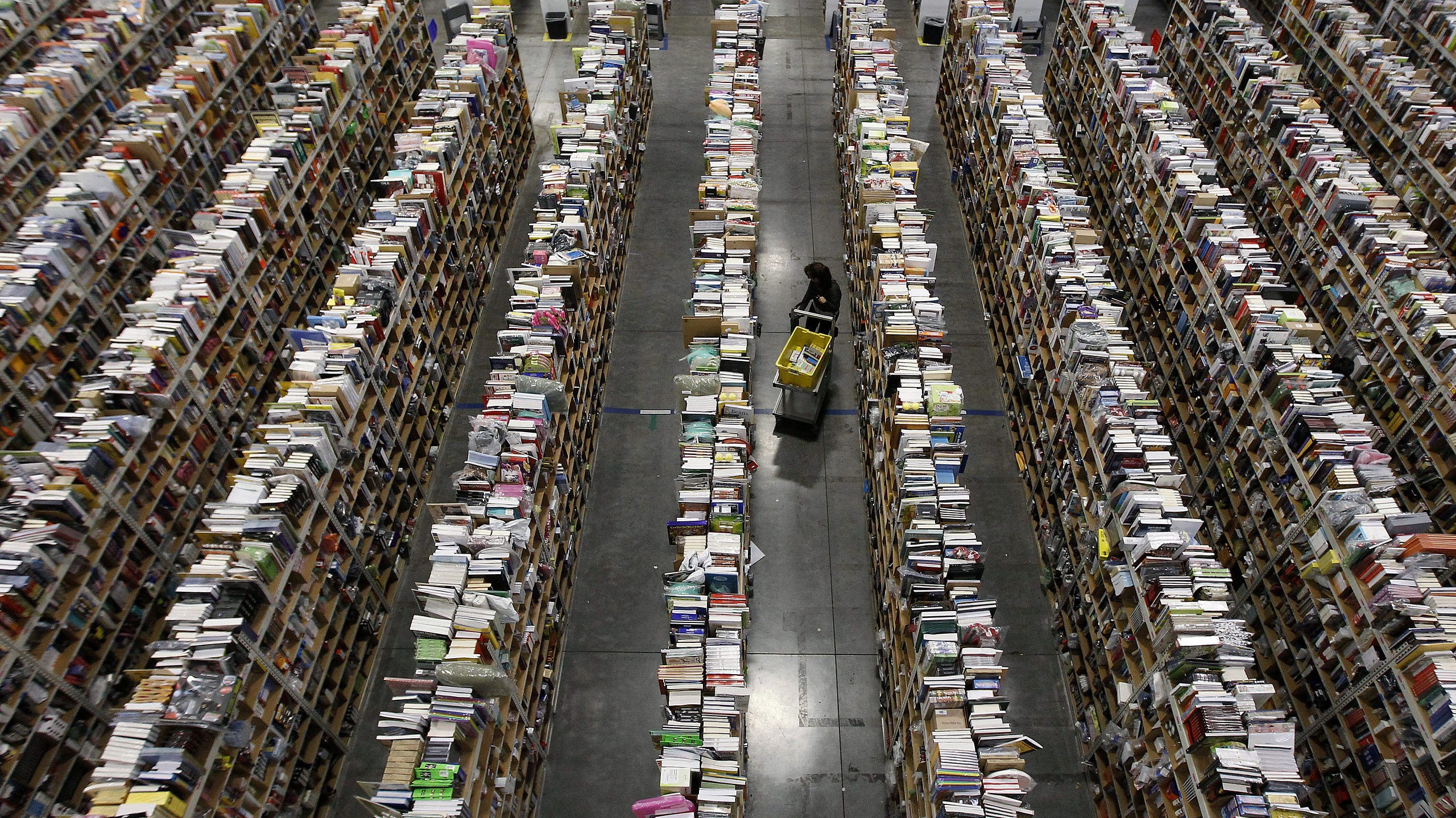
It’s a book seller, a retailer, a plane, a drone delivering something, no it’s just fuc*ing Amazon.

Amazon’s workforce is sky-rocketing and there’s no end in sight.
It added 159,500 people just in the three months between the end of June and the end of September.
It now employs 541,900 people. Amazon is expanding into India, Australia and even south-east Asia.
It will hire 120,000 seasonal workers this holiday season. What’s next for Amazon? #AmazonWorkForce
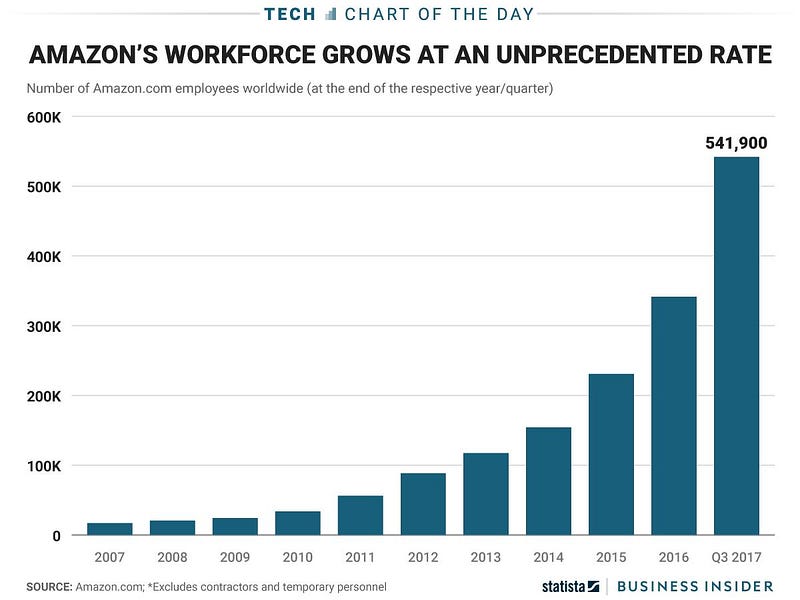

When Amazon held its IPO in 1997, the leadership at retail companies such as Walmart, Costco and Target probably didn’t lose any sleep over what that upstart online bookstore from Seattle might one day do to their businesses.
Amazon is now by far the largest retail company in the United States, at least in terms of market capitalization. Currently valued at $458 billion, Amazon is worth nearly twice as much as Walmart, which is still the largest retail chain in the country in terms of sales. #AmazonMarketCap
This chart was for May, 2017, 6 months later it’s $530.66B.
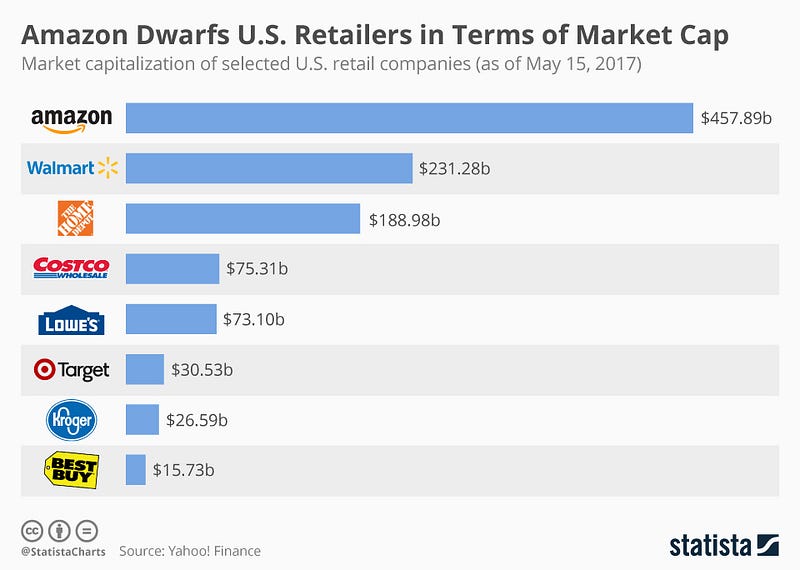
Beyond Hype and Beyond Definition
Amazon got into everything in 2017, from your grandma’s pills to Artificial Intelligence with more Alexa skills than anyone could ever possibly use. 26,000 by last count. Amazon is currently beating or about to beat up:
- Flipkart: its only serious E-commerce competition in India
- Google: its only serious competition for the one personal assistant that rules them all in the smart home.
- Walmart: who just can’t get E-commerce right fast enough and is always one step behind.
- Facebook: haven’t done a stellar job at anticipating the future, never mind building it, Amazon has done both, and offers sustainable value in the cloud.
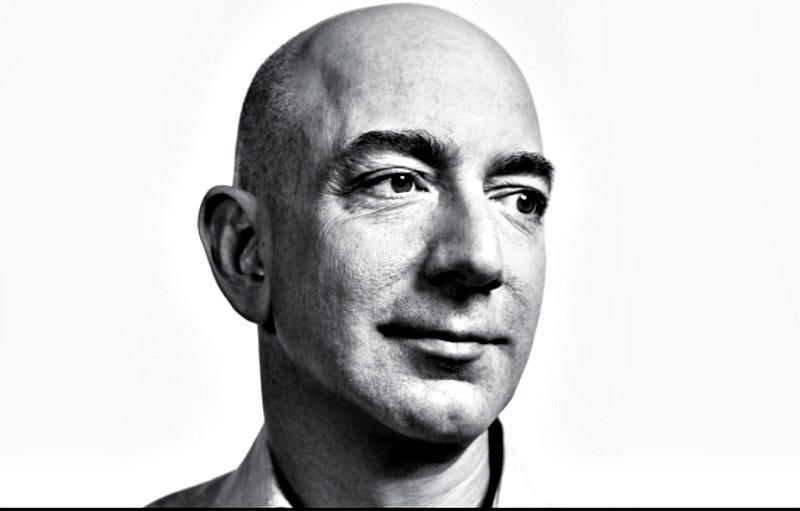
Amazon is the Rise of Fully Automated Luxury Space Communism (FALSC)
I’m an amateur Amazon evangelist, and I can’t keep up with Amazon’s innovations that they roll-out on a daily basis. They run a business model that does not require profits, because they put those back into the company. They are the most mentioned company on the web, in board rooms and conference calls.
In Amazon’s end-game, a Universal Basic Income is necessary for the outcome of a partially and progressively automated workforce. I believe Amazon is that company that brings us the 4th Industrial Revolution, brings us to Mars, in partnership with SpaceX and Blue Origin, and a whole lot more. Bezos is after all, the richest person on the planet.
More articles are written on Amazon, than probably Google, Facebook and Apple combined.
They have the scare, hype and awe factor all rolled out into one. That is their most powerful weapon, even more dangerous than Wall Street’s subservience and a growing monster that is Amazon Prime.
Amazon the Destroyer that Innovates New Industries
We think of Amazon as a time-bomb vs. big-box retail, but Amazon is becoming the same way vs. tech, banking and health technology companies. One simple way to put it is thus, Amazon in an accelerated and innovative way continues to invest in areas of growth at the expense of profitability, something most other retailers (and other firms) can’t afford to do. Even Google is failing at hardware, where Amazon is beating them, take the new emerging smart speaker market.
Amazon owns a 70%+ market share. For all the ubiquity of Google Assistant, it’s Alexa we want to interact with. This should scare companies not named Alibaba, Tencent, Huawei or Samsung. For all the other big western tech firms, this is serious trouble for the fate of the future channel of search (voice) and advertising (attention-economy).

Amazon is a Beast
Amazon has sold over 354 million different things, let that sink in for a moment.
Amazon is entering its prime (no pun intended), it’s 23 years old. While it learns about the world, it’s also doing many new things, failing at life and becoming more than just a retailer, a cloud solution or a consumer-AI and logistics-fulfillment company.
Amazon is getting into health care, is working on Alexa smart glasses, and its RFPs for it’s second HQ made International News many many times over. It received 238 bids from cities all over North America, all desperate to have Amazon come to town.
Amazon competes, and it topples entire industries. That’s where the fear factor comes in. But in 2017, wtf is Amazon? Is it a…..
- Retailer
- Cloud service
- Customer experience channel
- Logistics network
- Home automation company
- Book publisher
- Movie and streaming-show studio
- Fashion designer
- Hardware maker
- R&D firm
- E-commerce Giant
- Search engine for products
- Customer retention funnel?
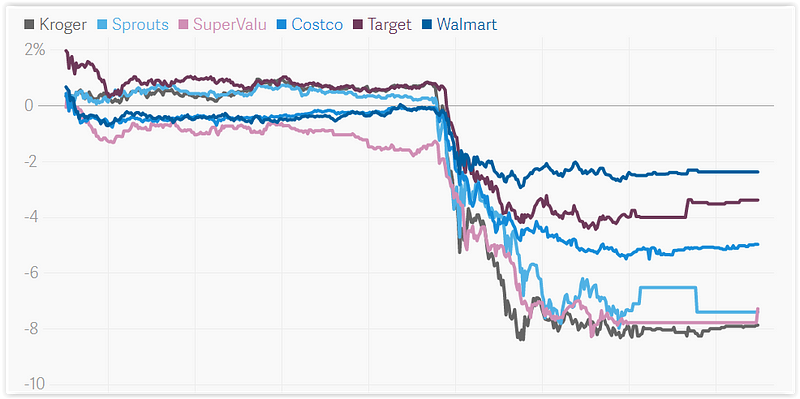
Data FactSet (Aug. 24, 2023)
- Amazon competes head-to-head with at least 129 major corporations just in those major markets.
Even at its massive size, Amazon still grew revenue 29 percent year over (29% YOY) year, not counting the Whole Foods addition.
AWS alone grew 42%.
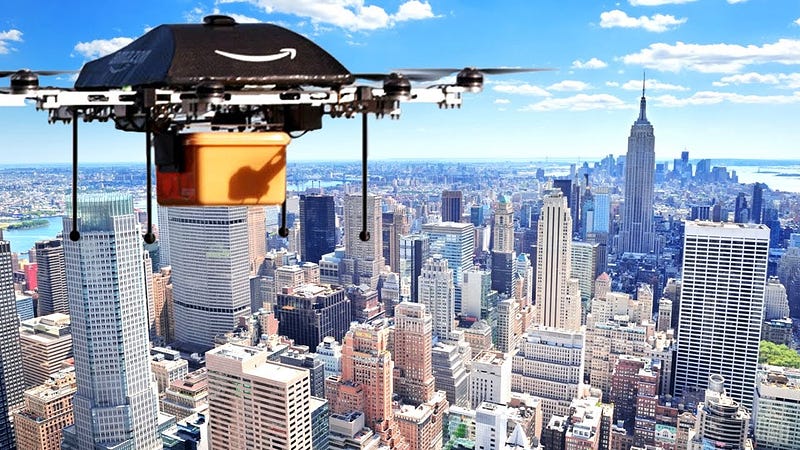
Amazon’s Ubiquity of Post Consumerism
What could Amazon become in some dystopia of what the U.S. becomes given the pace of automation? The firm that owns the A.I that decides what to give you, (your basic income), the firm where you order all of your food and health needs and the place where you go when you need anything, anything at all.
Nevermind antitrust scrutiny, Amazon may be the only company capable of competing against the rising Beijing backed tech companies of China. That’s not the sort of company you want to dismantle if you are the U.S. government or any other powers that be.
But hang on a second, Amazon’s market share of retail is pretty small right? It’s only represents 23% of the $395 billion Americans spent online last year. So besides Voice-AI and books (65% market share), it doesn’t really own that much. Yet curiously, it’s the one firm we all look up to.
Amazon has unparalleled trust in the hearts of consumers. If we enjoy Apple as a luxury brand, we need Amazon. That’s a different sentiment, and one that can last a lot longer as Amazon Prime is the best loyalty program subscription that ever existed.
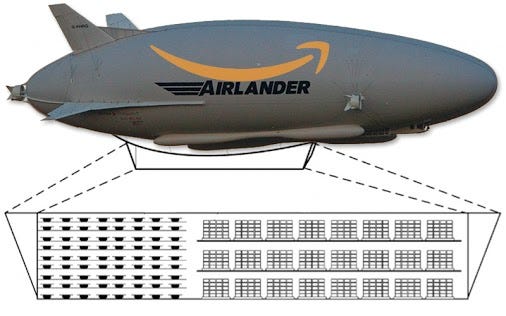
I mean, why would we not trust Amazon?
- Convenience, selection and price
- Speed, value and choice
- Unprecedented logistics and delivery infrastructure
- Access to data about purchasing habits (the most valuable Big Data on the planet)
- Significant inroads into consumer facing AI (Alexa Voice assistant).
- Rising in-house apparel brands, now the go-to marketplace for ubiquitous discovery of products
Amazon is becoming the native tech, consumer data and innovation company of our generation.
Amazon Has Room to Grow
Amazon has made great strides taking over E-commerce in India, and can fairly easily grow into healthtech, FinTech and banking and as an advertiser. In the era of biotech, pharma and next-gen ad-tech, Amazon can beat rivals due to the ecosystem it’s building including Amazon Prime, AWS and food services and delivery.
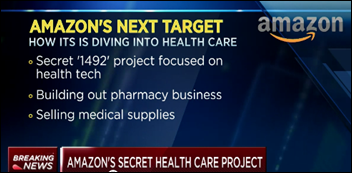
Amazon Isn’t Just the Next Bank, it’s the Next Health Services Hub
How difficult really would it be for Amazon to unify our health and financial data and consolidate with our consumer preferences? Really not that hard.
If a tech company could take over our banking and digital health records needs, it would have to be Amazon.
When it was announced Amazon already has a secret health-Tech division called 1492, we know their expansion into health services would get serious.
- Alexa skills to reduce friction in how we order and take drugs.
- A unified medical database on us with virtual access to doctors and the digitization of health services.
- Improved delivery to get drugs on time to optimize the delivery of all prescriptions and AI to match us with the right doctor.
- Artificial intelligence to help us optimize our lifestyle, diet and even our emotional, social and mental health.
- Amazon could create a more customer-centric health services experience across industries including access to genome, ancestry and predictive health outcomes to improve well-being and longevity.
- Hyper personalization of drug doses for each individuals based on machine learning and predictive analytics with lifestyle recommendations and short-term health goals and monitoring.
- Bring AI, empathy and respect to the healthy insurance field.
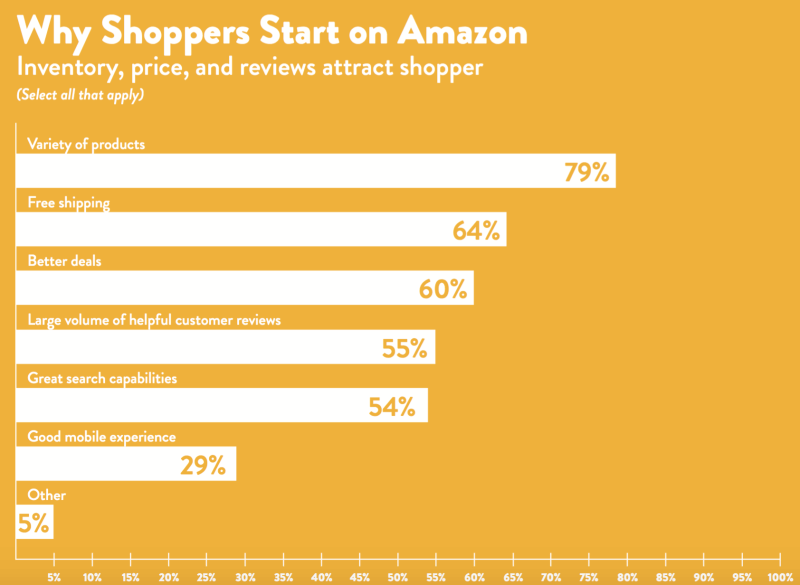
Amazon Isn’t Just a Consumer Fulfillment Channel, it’s the leading Discovery search engine
When we think of new media, Facebook comes to mind. When we think of search, Google comes to mind. But Amazon’s rise as a first point of entry for the discovery of experiences, not just stuff, means its the rising giant that the digital advertising duopoly should be most afraid of.
Remember, if Google has YouTube, arguably the one of the most important search engines that Millennials actually use, Amazon is growing up to be an entertainment-centric company as well. Already mastering convenience, Amazon is going for a much deeper level of immersion now. Books, audio books, video gaming live streaming, original on-demand video content, these are just the beginning.
While in 2017 we think of Amazon has primarily an E-commerce search engine handy for consumables and our holiday shopping, it’s quickly morphing into something far more ubiquitous. Indeed, even Google admits Amazon is its prime competition.
Amazon’s ability to leverage consumer data and consumer trust is unparalleled giving it the ability to add significant “sales attribution” to its attack on advertising. Amazon customer reviews are trustworthy with often highly detailed reviews. The customer experience of speedy delivery is for the most part, highly satisfactory. With the roll-out of Alexa devices in the smart home, Amazon is now positioning itself in the future of search, that is voice.
Voice and audio becomes very ubiquitous before 2020. As these IoT devices increase in number, and self-driving vehicles arrive, we’ll also have more disposable stream of attention and partial attention. Voice penetrates convenience and also the problem of having the attention span of a goldfish.
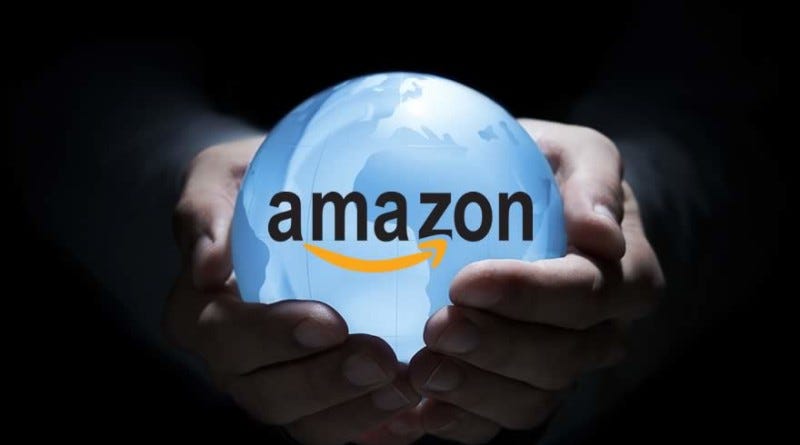
The Amazon Mindset is a New Business Model
With Uber trying to replicate Amazon’s core values, the closest copy-cats of Amazon’s business model will likely turn out to be Chinese firms. Incredibly investment in patents, R&D, diversified bets, go-to-market speed and always being one step ahead of the competition while being obsessively customer-centric pays off. Few companies can boast the deep pockets to truly fail at scale to grow their business; and Amazon has it down to a science.
It’s not therefore realistic to expect India’s Flipkart can compete with it, or even that Apple’s luxury emphasis on the iPhone X (a huge gamble), is sustainable in the way Amazon’s march into the future is. Apple might win the race to the world’s first 1 trillion dollar company, but Apple is already a relic of what it once was. Amazon’s dominance in the cloud and move to the entertainment space means
Amazon will easily surpass Netflix in subscribers with Amazon Prime, and it’s original content on Amazon Prime Video should improve dramatically in the next few years. You can’t expect Netflix to compete with Amazon, it’s just not realistic. The truth is, you can’t even expect Walmart to, in the end.
Google, Apple, Facebook, Microsoft, Alibaba and Tencent for all their talent, huge YOY growth cannot compete with Amazon, because they don’t share the same philosophy or business model.
Few companies are truly AI and innovation centric firms, and many of them will hit bottlenecks in the future of how firms evolve and in their markets respectively. Younger companies that can be compared with how Amazon operates youthfully and fluidly are Stripe or Shopify. But few companies have a pathway to scale the way Amazon did and will continue to do. You can see aspects of Amazon in Alibaba, Tencent or Softbank, but only perhaps Google realistically has the resources to keep up.
If you want to thrive and survive in the next era, you partner with Amazon. Something Microsoft, Shopify or even Kohl’s and Nike are learning.

















